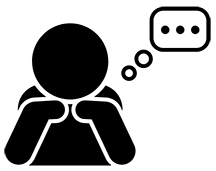13
The information contained in this chapter focuses on accessibility and usability of instructional materials, also often referred to as Universal Design for Learning (UDL). The goal with UDL and other accessibility and usability considerations is to connect all learners with content through multiple points of contact to support deeper learning. UDL is not specifically designing to meet accommodations, although accommodations are considered. It is about designing so all learners have multiple ways of accessing and using the content provided, to meet their learning needs that day. If text and numbers include a graphic representation, the information can be better understood by all learners. If PDFs are created as accessible, screen readers and other devices can read the text to all students, allowing students to read and listen at the same time. Again, the goal is to consider ways of access to create multiple points of contact with content.
 Resources
Resources
- The Accessibility Handbook for Teaching and Learning by Brianna Fraser & Luke McNight is an easy to use resource for ensuring the materials you use are accessible.
- The Vilas A. Prabhu Center for Academic Excellence (Millersville University’s center for teaching and learning) includes resources on Universal Design for Learning to help faculty build accessibly.
 Something to Ponder
Something to Ponder
Accessible design not only helps those with disabilities, but it can help many others as well. Though curb cuts were initially designed to help those in wheelchairs, we know that they make it easier for bikers, skaters, moms with strollers, and the elderly to navigate street crossings. The same can be true for accessibility improvements you make in your learning materials. The best improvement you can make improves the experience for all by removing barriers.
- In what ways can you make accessible changes to your instructional materials so that the learning experience is better for all students?
- What changes can you make to your course to support better access points with your content?
As we’ve emphasized throughout this book, OER adoption can be strengthened when adopters build community and conversation about their decisions and experiences. We invite you to not just ponder, but join this conversation on Twitter with #OERJourney.
